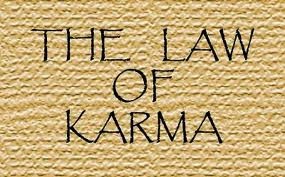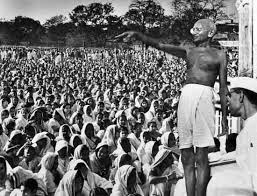The Law of Karma
There is a lot of misunderstanding around this word. Karma simply means
action. Every action has consequences. Conscious choice making is the most
effective way of creating future consequences of karma. Karma creates the
future, but it is also an echo from the past. Karma conditions our soul through
memory, desire and imagination. Most people are prisoners of Karma, because it
becomes a conditioned reflex and produces predictable outcomes in their lives.
The goal of enlightenment is to break the in shackles of Karma.
Every person is responsible for his or her acts and thoughts, so each
person's karma is entirely his or her own. Occidentals see the operation of
karma as fatalistic. But that is far from true since it is in the hands of an
individual to shape his own future by schooling his present.
Hindu philosophy, which believes in life after death, holds the doctrine
that if the karma of an individual is good enough, the next birth will be
rewarding, and if not, the person may actually devolve and degenerate into a
lower life form. In order to achieve good karma it is important to live life
according to dharma or what is right.
First things first,
Recently, I came across an interesting article, titled "Christianized Karma" by Katherine Britton:
“…but sanctify Christ as Lord in your hearts, always
being ready to make a defense to everyone who asks you to give an account for
the hope that is in you…”– 1 Peter 3:15
Christians give really good hugs during trials and
tragedy. As my own family has experienced recently, the body of Christ has long
arms to embrace those in need, easing the burdens of bad times. The church at
work offers silent – and strong – evidence of grace when we pick each other up
off the ground.
Now, imagine for a moment that your community didn’t
provide any support during a trial. Imagine that instead of offering
encouraging words and providing meals or other support after a tragedy, the
whole community pulled away. Imagine if they acted like you were a disease they
didn’t want to catch while you shouldered the burden alone. And not only that
-- they believed that your problems were your own fault, pure and simple.
That’s karma at work. And it’s a lonely road.
A missionary couple recently visited our church before
heading to London, where they planned settle in an immigrant community that’s
mostly Hindu. The wife expressed her desire to see people set free from the
bonds of karma. That caught my interest. I’d slipped into viewing karma through
an Americanized lens, as a pseudo-Christian philosophy of reaping what you sow
(Galatians 6:7). Faithfulness and selfishness often have their rewards in this
life, after all, and good deeds are often repaid with a smile and expression of
gratitude if nothing else. Karma may not be the full picture, but it seemed
like an innocuous truism to me.
The missionary went on to describe the ugly side of
karma, in which the community pulls away from its members who are suffering.
Lose a job? It’s a karmic effect – you must have cheated your employer or at
least talked badly about him. Did you – heaven forbid – lose a child? Somehow,
that’s your fault too, as the universe balances out some evil you’ve done. If
such horrible things are somehow your fault, it would also make sense for
people to pull away. That’s the bond of karma.
Christians rely on the promise that “all things work for
the good of those who love God” (Romans 8:28). We fight to believe that, while
“no discipline seems pleasant at the time… later on it produces a harvest of
righteousness” (Hebrews 12:11). Like Job, we may never know the reason for our
earthly suffering. But we know that, because of grace, suffering is not a
quid-pro-quo retaliation for our sins. Even our suffering has been redeemed by
God’s grace through Christ’s supreme act of love. (1)
Senior pastor William Graham Tullian Tchividjian says,
Westerners are understandably reticent to embrace the notion that the universe
is paying us back for a prior life of boozing, spousal abuse, or tax evasion.
We believe in the inherent goodness of human beings, after all! We prefer to
keep the cycle within the confines of a single life. But the appeal of this
perspective should be fairly obvious: no one gets away with anything. If
someone harmed you, she will suffer. If you do good, you will have a good life.
Karma puts us in control. The problem in this worldview comes, as it always
does, when we flip it around. If you are suffering, you have done something to
merit it. Pain is proof.
No doubt many of us would object to the accusation that
we share or agree with such a mind-set. That's simplistic nonsense, we might
think. No one with any education or experience would ever hold to such a
juvenile relational bartering system. But hold on for a moment. Think about the
last fight you had with your significant other-was there an element of
deserving tucked into the conflict? "You hurt me, so now I'll hurt
you"? I can't tell you how much self-abuse I've come across in my years of
ministry that had some element of inward-directed retribution at its core: the
teenage girl who punishes herself by cutting her arms; or men who sleep around
to prove that they deserve the contempt of their wives. If we cling to quid pro
quo when dealing with others and ourselves, why wouldn't we project it onto God
(or the universe)? We are all helpless moralizers, especially when it comes to
suffering.
On the opposite end of our natural tendency to moralize
life and suffering stands the counter-intuitive affirmation of Christianity.
Christianity affirms that Jesus severed the link between suffering and
deserving once for all on Calvary. God put the ledgers away and settled the
accounts. The good news of the gospel is NOT that good people get good stuff.
It's not that life is cyclical and that "what comes around goes
around." Rather, it's that the bad get the best, the worst inherit the
wealth, and the slave becomes a son (Rom.5:8).
Because the truth is, that it's just misery to try to
keep count of what God is no longer counting. Your entries keep disappearing.
(2)
References:
(1) Christianized
Karma - Crosswalk the Devotional - April 4, 2014
(2) You Believe in
Karma, BY TULLIAN TCHIVIDJIAN, CHRISTIAN POST COLUMNIST.
http://www.christianpost.com/news/you-believe-in-karma-79037/
Blessings,
Raj Kosaraju


i want to appreciate Dr.john for the restoration of my marriage with his spell casting after 2 years of separation with my husband ,with the help of the great spell caster Dr.john my husband return home and now we are happily together for good . once again thanks to Dr John 🏽.
ReplyDeleteHis services including
Voodoo
Love spell
Get Ex back
Lottery spell
Promotion spell
Financial spell
DM Dr John on his Email ,( drjohnspellhome7@gmail.com )
Or WhatsApp him (+234 9022990885 )
He also get the following Diseases cured .
HIV/aid
Arthritis
Fibromyalgia, Osteoarthritis
(Lyme disease)
ALS
Abdominal infection
Diabetes
Epilepsy , etc DM Dr John for help